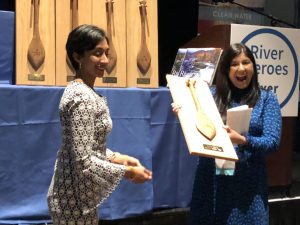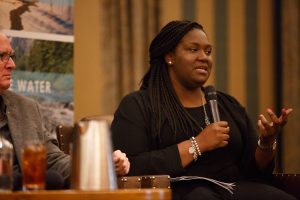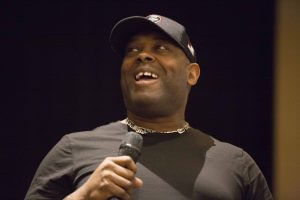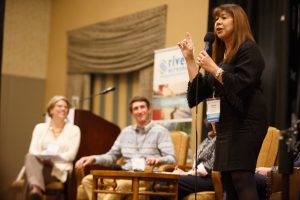Bridging the Gap in Equity, Diversity, and Inclusion: River Network’s Journey
A Moment In Time
 In the final stages of the recruitment process for my position with River Network, I had a poignant interaction with the hiring committee during our final meeting. After exploring many topics related to rivers, management, finance, fundraising, and nonprofits, they asked me what was missing that would allow us to achieve a future that included healthy rivers for all. My answer? We need a bigger, more diverse, and more inclusive movement for our waters.
In the final stages of the recruitment process for my position with River Network, I had a poignant interaction with the hiring committee during our final meeting. After exploring many topics related to rivers, management, finance, fundraising, and nonprofits, they asked me what was missing that would allow us to achieve a future that included healthy rivers for all. My answer? We need a bigger, more diverse, and more inclusive movement for our waters.
The answer was received with warmth and respect, and transformed the moment into one that was particularly bright. I knew I was in the right place, standing with an organization ready to broaden its relevance, its value proposition, and its impact.
Two years after that conversation, we openly shared River Network’s assertion that to remain socially relevant, we must evolve our organizations to become more diverse and our work to become both more inclusive and more open to exploring the challenges of equity through “Bridging the Divide,” published in our October 2015 issue of River Voices.
The article was inspired by the work of Dr. Dorceta E. Taylor and Green 2.0 in The State of Diversity in Environmental Organizations: Mainstream NGOs, Foundations & Government Agencies, the reality that our US population will be majority non-white within a generation, plus our reflections about inequities that exist in the water arena. River Network also had its own observations of inequities in the water space. In “Bridging the Divide,” River Network made its observations and intentions public, creating an implicit promise to our community to become a voice for change.
That issue of River Voices was also personal turning point for me. Instead of keeping my personal life separated from my professional world, I shared a part of my own story – my marriage to a Guatemalan immigrant, my hope that the color of my children’s skin wouldn’t cause people to judge them or limit their opportunities, my intention to do all that I could to provide them with a deep connection to nature, and my intent to pass on to them a belief that everyone can work together for good. As I opened up to our community, River Network’s transformation became personal.
Taking these steps in 2015 was risky. We were entering sensitive new territory. And yet, we did have experience to lean on. In many ways, the seeds of that transformation were scattered throughout River Network’s history. We had recruited diverse candidates for staff vacancies and board opportunities since our inception, engaged the tribal community by launching the Indigenous Waters Network in the early 2000s, and had done outreach to groups working in urban areas leading to the establishment of the Urban Waters Learning Network in 2012. Diverse thought leaders had also been welcomed and celebrated at River Rally, our national audience.
Each of these experiences helped River Network expand our understanding of the challenges facing people saving rivers and safeguarding our communities, our drinking water, our food, and our future. And yet, we knew we could do much more to expand equity, diversity, and inclusion (EDI) in our own work—to create a more diverse, inclusive, and just movement for water throughout our national network.
Deepening Our Commitment
 The board’s conversations about equity, diversity, and inclusion, in fact, began in 2012 (Diversity Subcommittee), continued with the Diversity Task Force (led by board member Baljit Wadhwa), and continued through today’s Equity, Diversity, and Inclusion Committee co-led by a staff member Diana Toledo and board member Beth Stewart followed by Jumana Vasi. One of the first goals of the board’s efforts was to educate board and staff about the importance of diversity and inclusion. This was accomplished through personal experiences, assigned readings, and field trips. This early work also contributed to what became the case for how equity, diversity and inclusion connects to our mission, noted below.
The board’s conversations about equity, diversity, and inclusion, in fact, began in 2012 (Diversity Subcommittee), continued with the Diversity Task Force (led by board member Baljit Wadhwa), and continued through today’s Equity, Diversity, and Inclusion Committee co-led by a staff member Diana Toledo and board member Beth Stewart followed by Jumana Vasi. One of the first goals of the board’s efforts was to educate board and staff about the importance of diversity and inclusion. This was accomplished through personal experiences, assigned readings, and field trips. This early work also contributed to what became the case for how equity, diversity and inclusion connects to our mission, noted below.
For staff and board members, many had experienced explicit and implicit bias as well as exposure to injustice based on income, class, race, and disability. While we shared those experiences, we also began digging more deeply into the intersection of water and equity – why some people have access to affordable, high-quality drinking water and others do not, why some neighborhoods are displaced by flood risk and others are not, why some people have access to opportunities to fall in love with rivers and others do not, how our laws and regulations contribute to disparity, and other topics.
In 2016, we released our first Our Water Our Future Trends Report, documenting current perceptions about threats, diversity within our community, and opportunities to make a difference. This report gave us important baseline information about organizations protecting rivers and advocating for clean water: The vast majority of our workforce (85%) reported very low levels of racial and ethnic diversity (under 25%).
In 2017 and through 2018, we made our commitment to lead by example more public and transparent. With the help of close advisors and external consultants, we finished the work on and published our case for how equity, diversity, and inclusion connects to our mission alongside our core values, and shared our principles for equitable and inclusive work via our website on the pages dedicated to mission, vision, and values. We also began using and referencing these statements in our recruitment practices for staff and board vacancies. We have been asked my multiple organizations whether they can adapt our materials to their circumstances. We happily consent and are glad that our discovery process and investment can help others.
 Over this same time period, we began evolving our approach for River Rally to make it more inclusive and welcoming for anyone in the river conservation and water advocacy space, including those dealing with the challenges at the intersection of water and equity. While River Rally had a long history of exposing our audience to leaders within the water space who came from diverse backgrounds, it wasn’t until River Rally 2016 that we became intentional in fully incorporating equity, diversity and inclusion into our workshop themes. The number of workshops related to the intersection of water and equity, diversity and inclusion has been on the rise ever since.
Over this same time period, we began evolving our approach for River Rally to make it more inclusive and welcoming for anyone in the river conservation and water advocacy space, including those dealing with the challenges at the intersection of water and equity. While River Rally had a long history of exposing our audience to leaders within the water space who came from diverse backgrounds, it wasn’t until River Rally 2016 that we became intentional in fully incorporating equity, diversity and inclusion into our workshop themes. The number of workshops related to the intersection of water and equity, diversity and inclusion has been on the rise ever since.
We’ve recruited inspiring plenary and keynote speakers and award recipients who represent and can speak to the diversification of our movement as well as unique challenges regarding our communities and the waters and rivers of our country, including Dr. Dorceta Taylor (University of Michigan professor and expert on diversity and the environmental movement), Dave Archambault II (Standing Rock Sioux Tribe Chairman during the protests pertaining to the Dakota Access Pipeline), Simone Lightfoot (NWF Urban Initiatives), Monica Lewis Patrick (We the People of Detroit), Derrick Evans (Gulf Coast community activist), Chad Brown (founder of Soul River, connecting inner city youth and U.S. veterans to the outdoors), Chief Caleen Sisk (of the Winnemem Wintu “Middle Water People” Tribe), Virginia Madueño (2018 candidate for U.S. Senate in California), and many others.
We also added social elements to River Rally that were intentionally designed to be more inclusive of people of color, included the master of ceremonies role at our ‘open mic’ and a ‘people of color happy hour’ to encourage networking and support among this cohort.
Our transformation of River Rally has been well-received, providing attendees with courage to begin their own organizational and personal journeys, and we received much positive feedback such as this: “Thank you for an incredibly important discussion about a difficult topic, achieving equity. This session brought together people with great experience and a lot of compassion and made me feel empowered to start an equity and inclusion conversation at my organization.”
Yet, we are the first to acknowledge that our efforts are not perfect and that we will make mistakes along the way. As our principles state, ours is a work in progress. We want and expect to be held accountable, we commit to listen and learn, and we invite others to join us. When we unintentionally offend others, we will acknowledge our fault and ask forgiveness.
What It Takes
 This is a journey for our organization, for our team, and for our community. What has changed in recent years is that considerations of equity, diversity, and inclusion are no longer an afterthought or something that we need to “add on.” They are part of how we do our work at every level of our organization.
This is a journey for our organization, for our team, and for our community. What has changed in recent years is that considerations of equity, diversity, and inclusion are no longer an afterthought or something that we need to “add on.” They are part of how we do our work at every level of our organization.
I can promise that our team will continue to be honest and vulnerable, bringing our own stories forward when appropriate (see opening remarks to River Rally 2016). We will continue to demonstrate our organizational commitment through our online magazine River Voices (see April 2017 edition), our webinars (see DEI series – part 1 and part 2), our programmatic work in specific geographies and addressing specific threats, and through the key issues identified within our new strategic plan fundamental to addressing today’s water crisis and aligning our network for collective action (safe, clean, affordable drinking water, healthy rivers in agricultural landscape, resilient cities and communities, and robust and effective water laws and policies).
We strive for a work force and a board that is reflective of the demography of the country where we live, seek opportunities for our staff and our board to learn and grow, and expect to expand our programmatic work at the intersection of water and considerations of equity, diversity, and inclusion.
We will continue to push ourselves to be a model for others and provide everyone with an opportunity to become part of this transformation. If you are interested in engaging, please dig in to the resources referenced by and linked within this document, attend River Rally, explore our webinars, and support our work. Be bold – take that first step!




